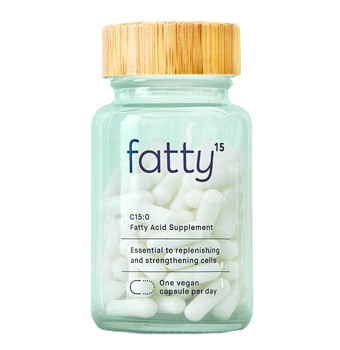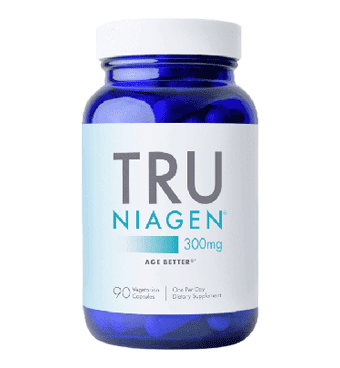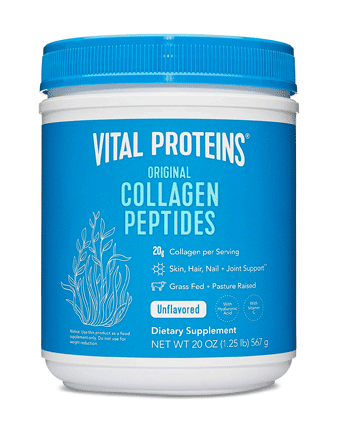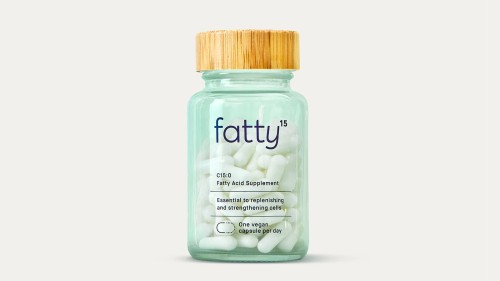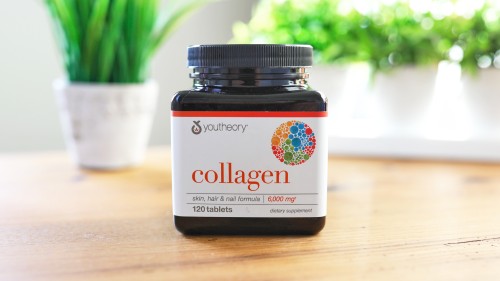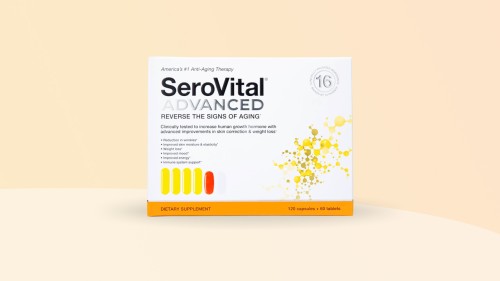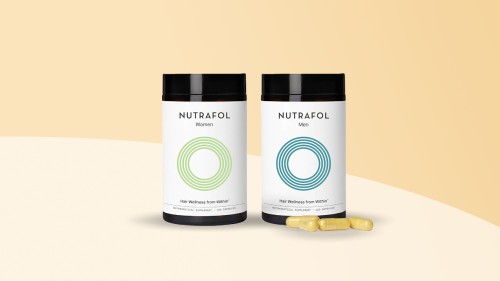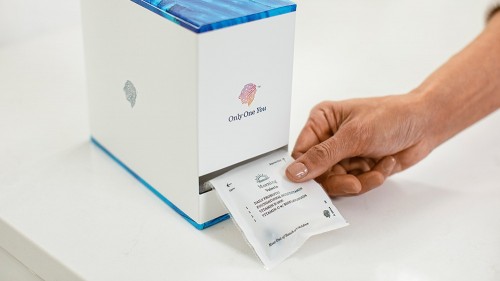WellnessVerge is reader-supported. We may earn a commission when you make a purchase through the links on this page. Learn more about our process here.
The 6 Best Anti-Aging Supplements of 2023, According to Dietitians
Last Updated on December 31, 2022
Medically Reviewed by Anthony Dugarte, MD
Looking to look younger than your chronological years? An anti-aging supplement may help you achieve that youthful glow.


You’ve heard the expression “age is but a number.” It’s certainly true that you’re only as old, or young, as you feel. However, aging is natural and unavoidable.
The human life expectancy is longer than ever before, so it’s important to understand what ages the body and what you can do to keep your body healthy and in good working order for as long as possible.
Many vitamins, minerals, and antioxidants offer anti-aging benefits.
You’ll also find herbs, plant compounds, collagen, fish oil, and more in supplements that promise a more youthful appearance, enhanced energy, cellular rejuvenation, and aging in reverse.
We looked for anti-aging supplements that are designed to decrease inflammation and provide antioxidant support. The supplements we list here contain some of the best ingredients to help your body minimize oxidative stress.
This list is not all-inclusive but highlights some of the more researched substances scientists have found to enhance cellular health, longevity, and physical signs of aging — like joints and skin.
While there are no magic pills to keep you looking and feeling forever young, supplements with ingredients that target aging at the source (the cellular level) may help you slow the hands of time and enjoy many healthy years to come.
Summary of Our Picks
- Best for cellular health: Tru Niagen, Thorne ResveraCel, Doctor’s Best Ubiquinol
- Best for longevity: Pure Encapsulations Green Tea Extract
- Best for joints: Swanson Curcumin Complex
- Best for skin: Vital Proteins Collagen Peptides
Best for Cellular Health
Tru Niagen
Pros
- Clinically proven to increase NAD+ levels
- FDA-approved
- Third-party tested
Cons
- Associated with mild side effects
- Expensive
Our Take
Tru Niagen is the only FDA-approved nicotinamide riboside supplement. It also has third-party testing and is NSF Certified for Sport.
Tru Niagen is a nicotinamide riboside supplement made by ChromaDex, available in capsule or powdered form. The capsules come in two strengths, 150 milligrams or 300 milligrams, and are taken twice or once daily, respectively. The powdered form can be added to a daily beverage of choice.
Niagen is a patented form of nicotinamide riboside and the only supplement of its kind that has been reviewed for safety by the Food and Drug Administration (FDA).
In clinical trials, Niagen has effectively increased blood levels of NAD+. (1) Animal and human studies have also linked Niagen supplementation with enhanced brain health and improved metabolism. (2, 3)
Although the FDA regards Tru Niagen as Generally Recognized as Safe (GRAS), some side effects were observed in the Niagen clinical trials. These include nausea, muscle pain, rash, and high blood pressure.
Tru Niagen is third-party tested and gluten-free, caffeine-free, vegan, and does not contain any artificial colors or flavors.
Price: $47 for a 30-day supply (300 mg). You can save 15% if you choose the Subscribe To Save option.
ResveraCel by Thorne
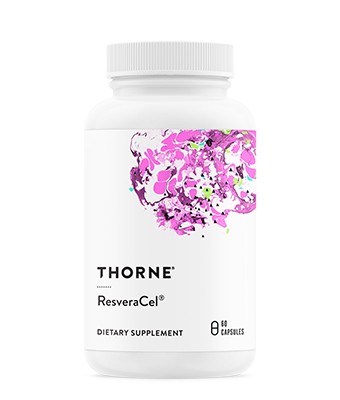
Pros
- Supports NAD+ levels
- Contains well-studied antioxidants
- 60-day satisfaction guarantee
Cons
- Expensive
- No third-party testing seal
Our Take
ResveraCel is expensive to take long-term, but the addition of resveratrol, quercetin, and betaine may result in greater anti-aging benefits.
ResveraCel is a supplement made by Thorne Research, available in capsule form. It contains nicotinamide riboside, resveratrol, quercetin, and betaine.
Quercetin is an antioxidant found in some foods, like grapes, berries, citrus fruit, and tea, with many health benefits, including decreasing cellular senescence in human stem cells. (4)
Betaine is an amino acid found in plant and animal foods that has anti-inflammatory properties and may also play a role in improving body composition by decreasing fat mass. (5, 6)
Nicotinamide riboside has been studied for safety in lab animals. No serious side effects have been noted even at high intakes on lab animals, but some mild side effects, including flushing of the skin, leg cramping, and nausea, have been reported in human studies. (7, 8)
Resveratrol, quercetin, and betaine are considered safe for most healthy people.
Price: $50 for a 30-day supply (60 capsules) on Amazon. You can save 15% by choosing the Subscribe & Save option.
Doctor’s Best Ubiquinol
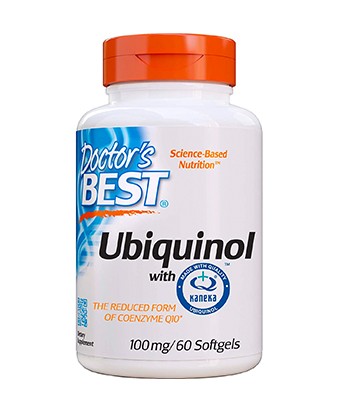
Pros
- Preferred form of CoQ10 for enhanced bioavailability
- Accessible at major retailers
- Affordable
Cons
- Return policy varies depending on the retailer that you buy from
Our Take
Doctor’s Best Ubiquinol is formulated for enhanced absorption and bioavailability and can help support CoQ10 levels.
Each dose of Doctor’s Best Ubiquinol contains 100 milligrams of coenzyme Q10 as ubiquinol, which is the active form of CoQ10.
CoQ10 supplements containing ubiquinol increase levels of CoQ10 more than supplements containing an equal amount of ubiquinone, the oxidized form of CoQ10. (9)
A 2019 study found CoQ10 dissolved in fat in soft gel form is more bioavailable than hard capsules or powdered form. (10)
Doctor’s Best Ubiquinol soft gels contain extra virgin olive oil and MCTs for enhanced absorption.
Ubiquinol and CoQ10 supplements are generally well tolerated. However, some people may experience mild digestive upset, which may be countered by taking this supplement with food. (11)
Price: $23.90 for a 2-month supply (60 capsules) on Amazon. You can save 15% by choosing the Subscribe & Save option.
Best for Longevity
Pure Encapsulations Green Tea Extract
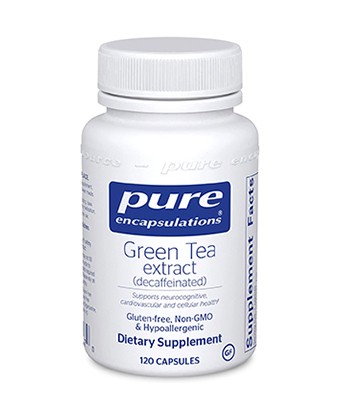
Pros
- Dose meets safety suggestions
- Affordable
- Allergen-free
Cons
- No third-party testing
Our Take
Pure Encapsulations Green Tea Extract is a good choice if you’re sensitive to caffeine and is within the safety suggestions for EGCG dosage.
Pure Encapsulations Green Tea Extract contains 100 milligrams of green tea extract standardized to contain a minimum of 70% EGCG.
One cup of brewed green tea is estimated to contain 50–100 milligrams of catechins, so the amount of EGCG in this product is equivalent to drinking 1 to 2 cups of tea.
A 2018 systematic review suggests 338 milligrams of EGCG per day is a safe amount to avoid liver toxicity. Unfortunately, many other green tea extract supplements contain doses of EGCG that are double to triple this amount. (12)
The product does not contain any caffeine, which is one benefit to supplementing with green tea extract versus consuming tea. Caffeine-sensitive individuals who suffer from stimulant-related side effects can safely take this supplement.
The capsules are vegetarian and do not contain any common allergens.
Price: $27.15 for a 2-month supply (60 capsules) on Amazon.
Best for Joints
Swanson Curcumin Complex
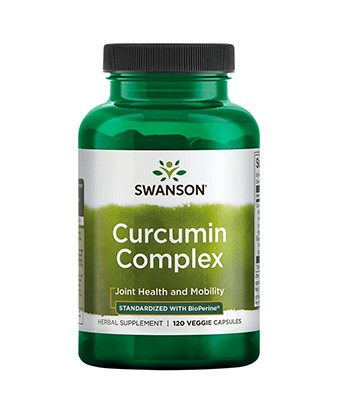
Pros
- Formulated for enhanced absorption
- Affordable
- Allergen-free
- Third-party tested
Cons
- Return policy varies depending on the retailer that you buy from
Our Take
Swanson Curcumin Complex is formulated for optimal absorption and is third-party approved for quality.
The curcumin complex in this supplement is standardized to contain 95% curcuminoids and delivers 700 milligrams of curcumin per dose.
It also contains BioPerine, also known as black pepper extract, which has been clinically proven to increase the absorption rate of curcumin up to 2000%. (13)
Swanson is a trusted supplement brand and subjects all its products to third-party testing for optimal quality. Each dose is two capsules, and the formula is free from common allergens.
Curcumin and black pepper extract are generally well tolerated. However, a few mild side effects related to curcumin supplements have been documented, including nausea, diarrhea, headache, and rash. (13)
Price: $20.78 for a 2-month supply (120 capsules) on Amazon. You can save 10% by choosing the Subscribe & Save option.
Best for Skin
Vital Proteins Collagen Peptides
Pros
- Collagen sourced from responsibly-raised cattle
- Powdered form is versatile and easy to use
- Minimal ingredient list
- Free from common allergens
Cons
- Lacks third-party testing seal
- Contains only two types of collagen
- Return policy varies depending on the retailer that you buy from
Our Take
Vital Proteins Collagen Peptides is easy to incorporate into your daily routine and may support skin health. It costs a bit more than other collagen peptide powders, but it provides more grams of collagen per serving. Purchasing the larger, 20-ounce tub is more cost-effective.
Vital Proteins has an extensive collection of collagen supplements, including powders, ready-to-drink beverages, and gummies.
The collagen is sourced from either grass-fed cattle or wild-caught fish and is hydrolyzed (i.e., broken down) for better absorption.
I recommend their original powdered Collagen Peptides product, which contains all the ingredients mentioned above. It dissolves in cold or hot liquids, so you can use it in smoothies, coffee, broth, or other recipes.
The recommended dosage is two scoops of collagen per day, which provides 18 grams of protein, 20 grams of hydrolyzed collagen, 90 milligrams of vitamin C (100% of the Daily Value), and 80 milligrams of hyaluronic acid.
Collagen supplements are considered safe with no adverse effects to note. Some people report mild digestive upset when taking collagen, but research hasn’t documented this finding. (14)
Price: $44.88 for a 20-ounce tub (about 28 servings) on Amazon. You can save 15% by choosing the Subscribe & Save option.
Things to Consider When Shopping for an Anti-Aging Supplement
Here are some things to consider as you choose the best anti-aging supplement to add to your routine:
-
Claimed Benefits: Paying attention to what a product claims it can do for your health can help you understand its formulation if you’re unfamiliar with the ingredients (see "Ingredients to Look For" below). If you’re looking for an anti-aging supplement that boosts energy or reduces fine lines and wrinkles, look for these benefits on the product packaging.
-
Form and Dosage: Consider the form and dosage of the supplement to make sure it’s realistic for you to take long-term. Anti-aging supplements work best when they’re taken regularly. Because cellular aging is ongoing, any benefits you experience may cease if you stop taking the supplements after a few weeks or months, so make sure the supplement you choose is easy to use.
-
Price: The supplement’s price is also a key consideration since you’ll likely take anti-aging supplements long-term. Consider the ongoing cost per month to make sure it fits within your budget.
-
Allergens: Supplements can contain common allergens, like dairy, fish, or soy. Check the ingredient label if you have dietary restrictions.
-
Third-Party Certification: Most supplements claim to be third-party tested for ingredient safety, purity, and potency. However, without an official seal on the product, you have to trust the manufacturer on this. If ingredient quality is non-negotiable for you, look for a seal on the product label. Common ones include NSF International and Consumer Labs.
-
Medical Conditions: You should always check in with your primary healthcare provider before starting a new supplement. Some age-related concerns may stem from an underlying medical condition that needs to be managed by a doctor.
Ingredients to Look For, Plus Tips
When searching for an anti-aging supplement to best fit your needs, here are some tips on the ingredients you should be looking for when it comes to cellular health, longevity, joints, or skin.
For Cellular Health
For cellular health support, look for supplements with NAD+, resveratrol, and CoQ10.
NAD+ is a coenzyme involved in numerous cellular functions, including energy production. A group of proteins, called sirtuins, keep cells healthy and require NAD+ to function. (15)
Unfortunately, levels of NAD+ naturally decrease with age, which can result in decreased metabolism and mitochondrial dysfunction. Mitochondrial dysfunction is associated with many chronic disease states.
Supplementing with nicotinamide riboside, which is one of five precursors to NAD+, increases levels of NAD+ in the body, supports mitochondrial function, and can prolong the life of cells. (16)
Resveratrol, known as the red wine compound, is found in the skin of grapes and berries. (17) It displays powerful antioxidant, anti-inflammatory, and antitumor properties in clinical trials. Resveratrol also enhances sirtuin function. (18)
CoQ10 (coenzyme Q) is also naturally found in the body. It has antioxidant properties that protect cell membranes from oxidative stress and supports mitochondrial function. (19)
Providing cells with these substances can help them continue to function, repair the damage, and replicate.
For Overall Longevity
One ingredient to look for to support overall health and longevity is EGCG.
This ingredient displays powerful antioxidant and anti-inflammatory properties and is a dietary staple in Blue Zones around the globe. (20)
EGCG is a catechin compound found in green tea. Although more research in humans is needed, it’s shown promising benefits in the test tube and animal studies, including longer lifespan and skin anti-aging benefits. (21, 22)
The anti-inflammatory mechanisms of EGCG and curcumin are also believed to lessen the risk of developing chronic diseases, like heart disease and type 2 diabetes, which can shorten the lifespan. (23)
For Joint Health
Staying active is an important part of aging gracefully and maintaining energy levels through the years. Regular movement is necessary to maintain strength, flexibility, and range of motion that decreases with age.
However, exercise may not be so enjoyable if your joints feel stiff and achy. You can boost the health of your joints, keep them feeling pain-free, and lessen any existing arthritic pain with turmeric.
Turmeric is the golden spice found in curry powder. The active ingredient in turmeric is curcumin, but it’s present in very low amounts and not very well absorbed. (24, 25)
Turmeric supplements contain concentrated doses of curcumin designed for bioavailability. Like EGCG, curcumin has powerful anti-inflammatory properties that can benefit overall longevity and skin health.
Research has found curcumin supplements to work similarly to NSAIDs, such as ibuprofen, for relieving inflammation that causes joint pain, stiffness, and swelling. (26)
Turmeric and curcumin supplements do not have the same side effects, like gastrointestinal ulcers and bleeding, that over-the-counter anti-inflammatory drugs do.
For Skin Health
No list of anti-aging supplements is complete without addressing outward signs of aging, which tend to be consumers’ greatest concern. Outward signs of aging can include wrinkles, dry skin, and loss of skin elasticity that results in sagging.
Collagen, vitamin C, and hyaluronic acid are the best ingredients to prevent signs of skin aging. These ingredients are generally safe for all healthy adults to take, and adverse reactions are rare.
Collagen is a structural protein found in the skin.
A 2019 review concluded collagen supplementation is effective at increasing skin elasticity and hydration, which may result in the reduction of the appearance of wrinkles. (14)
Collagen is sourced from animals, so it’s not a good choice for anyone following a vegetarian or vegan lifestyle. Some collagen products contain common allergens, like fish or eggs. Be sure to check the ingredient label if you have food allergies or sensitivities.
Hyaluronic acid binds with water and can also enhance skin hydration to reduce the appearance of dry, dull skin. (27)
Vitamin C is one of the best-known antioxidants that can counteract cellular damage. It also plays a role in the body’s production of collagen. (28)
The Aging Process and Your Cells
Before outward signs and symptoms of age appear, aging is always occurring at the cellular level. Every part of your body is made of cells, which are in a constant state of turnover. Every time a cell regenerates, it has to copy and replicate the DNA it contains.
DNA encounters damage through oxidative stress. Substances called free radicals and reactive oxygen species (ROS) create lesions in DNA. (29) These substances also shorten telomeres, which are a protective part of each chromosome.
As you age, the body becomes less efficient at repairing this damage for a number of reasons. Genetics and chronic inflammation play a large role in the aging process. (30)
Some factors that accelerate cellular damage include ultraviolet light, environmental pollutants, poor nutrition, stress, drugs, and alcohol. Some of these factors are within your control, while others are not.
If your body can’t keep up with repairing the amount of cellular damage it incurs, impaired DNA gets copied into new cells, which is believed to be one of the root causes of age-related decline, chronic disease, and shorter lifespans.
Cellular damage also leads to senescence, which is the end of a cell’s life cycle when cells completely stop dividing. (31)
Some substances can help cells defend against oxidative stress and inflammation — two processes that lead to damage and premature wear and tear on our cells. This is where anti-aging supplements can help.
Frequently Asked Questions About Anti-Aging Supplements
At what age should I start taking anti-aging supplements?
Most people don’t think about anti-aging supplements until they notice a few wrinkles in the mirror or feel more achy or forgetful than they used to.
In reality, supplementing with antioxidants, like resveratrol, curcumin, and CoQ10, can start at any point in adulthood.
No anti-aging supplement can make you age in reverse. Still, the sooner you start to minimize inflammation and stress that leads to aging, the better.
What is the best supplement for younger-looking skin?
No supplement guarantees younger skin. Eating a diet rich in vitamins, minerals, and antioxidants helps promote youthful skin. In particular, vitamins C, D, E, and K benefit skin health.
If you’re worried about nutritional gaps, ask your healthcare professional if you should be taking a multivitamin.
It’s also important to hydrate the skin by drinking plenty of water and protecting the skin from oxidative damage that occurs from exposure to ultraviolet light. Preventative measures include wearing sunscreen and protective clothing.
What is the best vitamin for anti-aging?
There's no one vitamin that's "best," but if you're focused on anti-aging, look for products with vitamins C and E. Both of these vitamins are antioxidants that can help protect the skin against damage caused by environmental pollution and ultraviolet light (i.e., the harmful portion of sunlight).
Vitamin C is also needed for the synthesis of collagen, which is the main structural protein found in skin, hair, and nails.
Vitamin E also helps condition the skin and counteracts dryness. A loss of collagen and skin moisture results in older-looking skin.
What other ingredients offer anti-aging benefits?
Omega-3 fatty acids possess anti-inflammatory properties and are one of the nutrients credited with enhancing longevity in Blue Zones found around the globe.
The best sources of omega-3’s are fatty fish, like salmon, or fish oil supplements. You can also find omega-3’s in walnuts, flax seeds, and chia seeds.
Garlic, as well as some spices like cinnamon and ginger, have powerful antioxidant and anti-inflammatory properties.
I cook with turmeric. Do I need to supplement with it, too?
Unfortunately, our bodies aren’t efficient at absorbing curcumin from turmeric. So you’d need to eat large quantities to get enough curcumin to match doses associated with health and anti-aging benefits.
Most curcumin supplements contain concentrated doses of curcumin plus other ingredients, like black pepper extract, to help enhance absorption.
Besides supplements, what else can I do to support longevity?
Choose nutrient-dense foods like fruits, vegetables, beans, and whole grains to ensure you’re getting a variety of vitamins, minerals, and antioxidants. Avoid hydrogenated oils, trans fats, excessive alcohol, and sugary foods. Stay well-hydrated.
Prioritize getting enough sleep, managing stress levels, and engaging in regular physical activity. Doing activities you enjoy for your mind and body is crucial for happiness, mental wellness, and overall health and longevity.
The Bottom Line
While it’s not possible to entirely erase physical signs of aging — like wrinkles, sagging skin, and age spots — it is possible to slow the aging process and preserve health by providing the body with substances that naturally decline as we age.
There are many supplements and nutrients that can provide anti-aging benefits. Before choosing an anti-aging supplement, consider your primary goal and look for a product that claims to address that goal.
You should also speak with your primary healthcare provider to help you choose the right supplement that’s the best and safest for you.
Although aging cannot be prevented, some supplements may give your cells an edge to keep functioning optimally for longer.
At WellnessVerge, we only use reputable sources, including peer-reviewed medical journals and well-respected academic institutions.
- Safety and Metabolism of Long-term Administration of NIAGEN:
https://pubmed.ncbi.nlm.nih.gov/31278280/ - Can nicotinamide riboside protect against cognitive impairment?:
https://pubmed.ncbi.nlm.nih.gov/32925178/ - Nicotinamide Riboside—The Current State of Research and Therapeutic Uses:
https://www.ncbi.nlm.nih.gov/pmc/articles/PMC7352172/ - Therapeutic Potential of Quercetin: New Insights and Perspectives for Human Health:
https://www.ncbi.nlm.nih.gov/pmc/articles/PMC7254783/ - Betaine in Inflammation: Mechanistic Aspects and Applications:
https://www.ncbi.nlm.nih.gov/pmc/articles/PMC5976740/ - The effects of chronic betaine supplementation on body composition and performance in collegiate females: a double-blind, randomized, placebo controlled trial:
https://www.ncbi.nlm.nih.gov/pmc/articles/PMC6069865/ - Safety Assessment of High-Purity, Synthetic Nicotinamide Riboside (NR-E) in a 90-Day Repeated Dose Oral Toxicity Study, With a 28-Day Recovery Arm:
https://pubmed.ncbi.nlm.nih.gov/32715855/ - Chronic nicotinamide riboside supplementation is well-tolerated and elevates NAD+ in healthy middle-aged and older adults:
https://www.ncbi.nlm.nih.gov/pmc/articles/PMC5876407/ - Comparison study of plasma coenzyme Q10 levels in healthy subjects supplemented with ubiquinol versus ubiquinone:
https://pubmed.ncbi.nlm.nih.gov/27128225/ - Bioavailability of coenzyme Q10 supplements depends on carrier lipids and solubilization:
https://icqaproject.org/wp-content/uploads/2019/03/Lo%CC%81pez-Lluch-19-Nutrition-133.pdf - Coenzyme Q10:
https://www.ncbi.nlm.nih.gov/books/NBK531491/ - The safety of green tea and green tea extract consumption in adults – Results of a systematic review:
https://www.sciencedirect.com/science/article/pii/S0273230018300928 - Curcumin: A Review of Its’ Effects on Human Health:
https://www.ncbi.nlm.nih.gov/pmc/articles/PMC5664031/ - Oral Collagen Supplementation: A Systematic Review of Dermatological Applications:
https://pubmed.ncbi.nlm.nih.gov/30681787/ - Sirtuin signaling in cellular senescence and aging:
https://www.ncbi.nlm.nih.gov/pmc/articles/PMC6386230/ - NAD + biosynthesis, aging, and disease:
https://www.ncbi.nlm.nih.gov/pmc/articles/PMC5795269/ - Resveratrol: A Double-Edged Sword in Health Benefits:
https://www.ncbi.nlm.nih.gov/pmc/articles/PMC6164842/ - Sirtuins, brain and cognition: A review of resveratrol effects:
https://www.sciencedirect.com/science/article/pii/S2451830120300194 - Coenzyme Q10 Supplementation in Aging and Disease:
https://www.ncbi.nlm.nih.gov/pmc/articles/PMC5807419/ - Blue Zones Lessons From the World’s Longest Lived:
https://www.ncbi.nlm.nih.gov/pmc/articles/PMC6125071/ - The phytochemical, EGCG, extends lifespan by reducing liver and kidney function damage and improving age-associated inflammation and oxidative stress in healthy rats:
https://pubmed.ncbi.nlm.nih.gov/23834676/ - Anti-skin-aging effect of epigallocatechin gallate by regulating epidermal growth factor receptor pathway on aging mouse model induced by d-Galactose:
https://pubmed.ncbi.nlm.nih.gov/28343910/ - Epigallocatechin Gallate: A Review of Its Beneficial Properties to Prevent Metabolic Syndrome:
https://www.ncbi.nlm.nih.gov/pmc/articles/PMC4517007/ - Effects of resveratrol, curcumin, berberine and other nutraceuticals on aging, cancer development, cancer stem cells and microRNAs:
https://www.ncbi.nlm.nih.gov/pmc/articles/PMC5509453/ - Curcumin content of turmeric and curry powders:
https://pubmed.ncbi.nlm.nih.gov/17044766/ - A new curcuma extract (flexofytol®) in osteoarthritis: results from a belgian real-life experience:
https://pubmed.ncbi.nlm.nih.gov/25352926/ - Ingested hyaluronan moisturizes dry skin:
https://www.ncbi.nlm.nih.gov/pmc/articles/PMC4110621/ - Vitamin C—Sources, Physiological Role, Kinetics, Deficiency, Use, Toxicity, and Determination:
https://www.ncbi.nlm.nih.gov/pmc/articles/PMC7918462/ - Physiology, Aging:
https://www.ncbi.nlm.nih.gov/books/NBK556106/ - The Telomere/Telomerase System in Chronic Inflammatory Diseases. Cause or Effect?:
https://www.ncbi.nlm.nih.gov/pmc/articles/PMC5042391/ - Developmental Biology. 6th edition. Aging: The Biology of Senescence:
https://www.ncbi.nlm.nih.gov/books/NBK10041/

